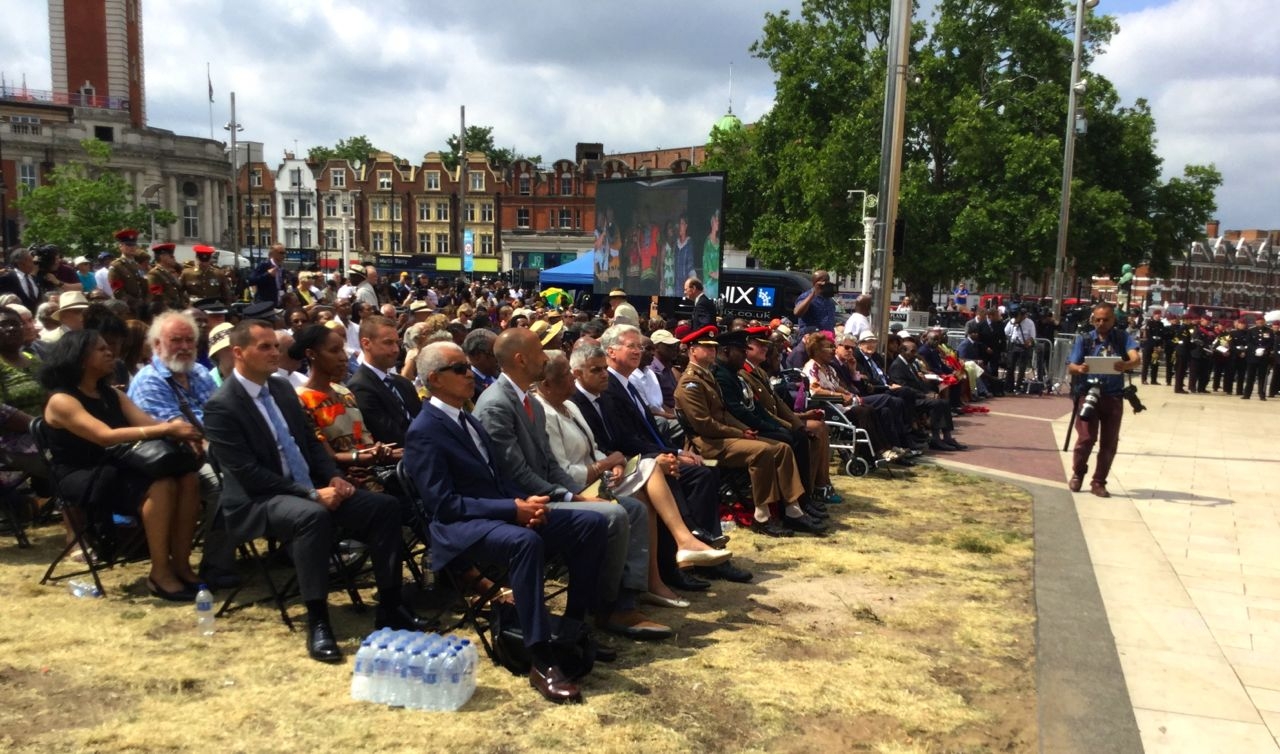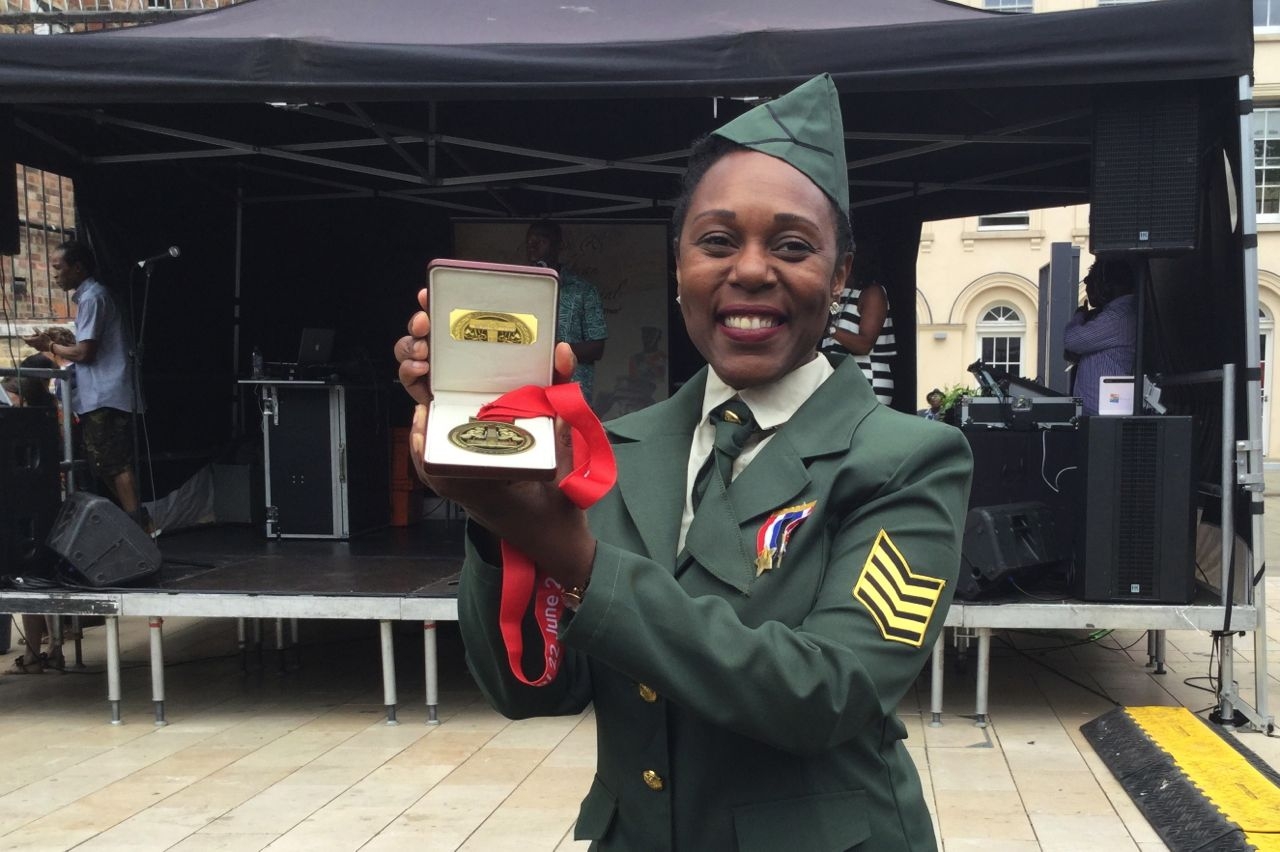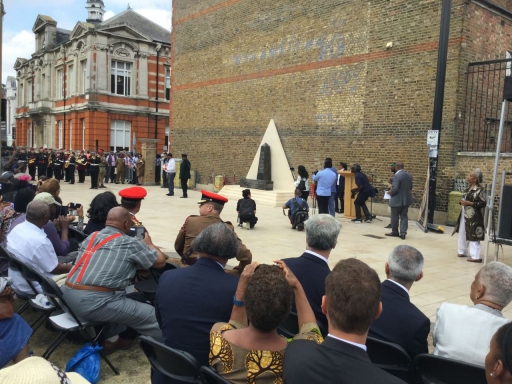A monument unveiled in south London last week finally honoured the many thousands of servicemen and women from African and Caribbean countries who fought and died for Britain in the First and Second World Wars. CN’s Patrick Gregory reports from the ceremony.
It was, agreed organisers and guests alike, a moment to savour: a dedication to the fallen long overdue. The hundreds who gathered in Brixton’s Windrush Square on Windrush Day, June 22, did so to celebrate the contribution made to the British war effort in two world wars by men and women, both soldiers and auxiliaries, from Africa and the Caribbean.
The African and Caribbean Memorial has been seven years in the offing, the brainchild of the Nubian Jak Trust, a cultural and educational community organisation who saw it as the logical extension of a previous campaign to erect dozens of blue plaques around the country marking the role played by prominent figures in black history in the UK.
The military monument that the trust campaigned for, and raised funds to support, is a striking composition. Made up of two black obelisks of Scottish whinstone, each six feet tall, one rises vertically like a sentry on duty while the second lies prone. The two are engraved with the names of regiments and units from the territories who contributed to these 20th century war efforts, as well as those currently serving in the forces.
 Guests, including UK Defence Secretary Sir Michael Fallon, gathered in Windrush Square (Photo: Centenary News)
Guests, including UK Defence Secretary Sir Michael Fallon, gathered in Windrush Square (Photo: Centenary News)
Commonwealth High Commissioners and defence chiefs or their representatives from the countries in question were all present. They joined British dignitaries who included the London Mayor Sadiq Khan, the patron of the African and Caribbean Memorial Baroness Ros Howells, and Lord Ouseley, former head of the Commission for Racial Equality.
All three spoke ahead of the unveiling and guests also heard a tribute read from Her Majesty the Queen who talked of the ‘resolute courage of the two million African and Caribbean soldiers who served’ in the two conflicts.
The numbers of those who served and died do indeed bear some scrutiny. From the Caribbean shores alone in World War I over 20,000 volunteers came to Europe or the Middle East to fight or act as auxiliaries. More than 15,000 of them were from the British West Indies Regiment, two thirds of which was raised in Jamaica; although the regiment was also the home of soldiers from a host of other island communities such as Trinidad and Tobago, Barbados, the Bahamas, Grenada, the Leeward Islands, St Lucia and St Vincent.
Some of these took up a frontline role in Palestine and Jordan against Turkish forces; but in the segregated climate of the Western Front many were forced to undertake lesser, often more dangerous tasks in forward positions in the face of enemy fire, digging trenches and loading ammunition. Around 1,200 were killed and 2,500 wounded.
The casualty figures from Africa were starker still. The total British death toll reached an estimated 105,000 counting African troops and military carriers, largely on the continent of Africa itself where famously ‘the first shot of the First World War’ had been fired in August 1914. Africa’s contribution continued into the next conflict with over one million serving in British forces in World War II, drawn from South Africa and the British colonies of east and west Africa.
The crowd attending the ceremony in Brixton last week saw servicemen and women past and present lay wreaths at the new memorial. There was a parade and walk-past with bands, veterans and cadets and, before the end, a presentation of medals to some survivors and descendants of the units who fought.
 One of the commemorative medals went to the poet and performer Nairobi Thompson (above) who received it on behalf of her late great uncle Walter Tull, the first British-born black officer to serve in the British army. Tull fought at the Somme and won a Military Cross but also enjoyed a previous pre-War career as a footballer, playing for Tottenham Hotspur and Northampton Town.
One of the commemorative medals went to the poet and performer Nairobi Thompson (above) who received it on behalf of her late great uncle Walter Tull, the first British-born black officer to serve in the British army. Tull fought at the Somme and won a Military Cross but also enjoyed a previous pre-War career as a footballer, playing for Tottenham Hotspur and Northampton Town.
The British government was represented at the event by the Defence Secretary, Sir Michael Fallon, who told the crowd: “It is a pleasure and a privilege to be here in Brixton. Service and sacrifice deserves proper recognition. This recognition today is long overdue.”
It was a point taken up by Dr Doirean Wilson of the Nubian Jak Trust: “That’s the stark reality. It should’ve happened years ago.” But, she added brightly: “as they say, it’s better late than never.” A sentiment echoed by many of those present.
Images: Centenary News
Posted by: CN Editorial Team
